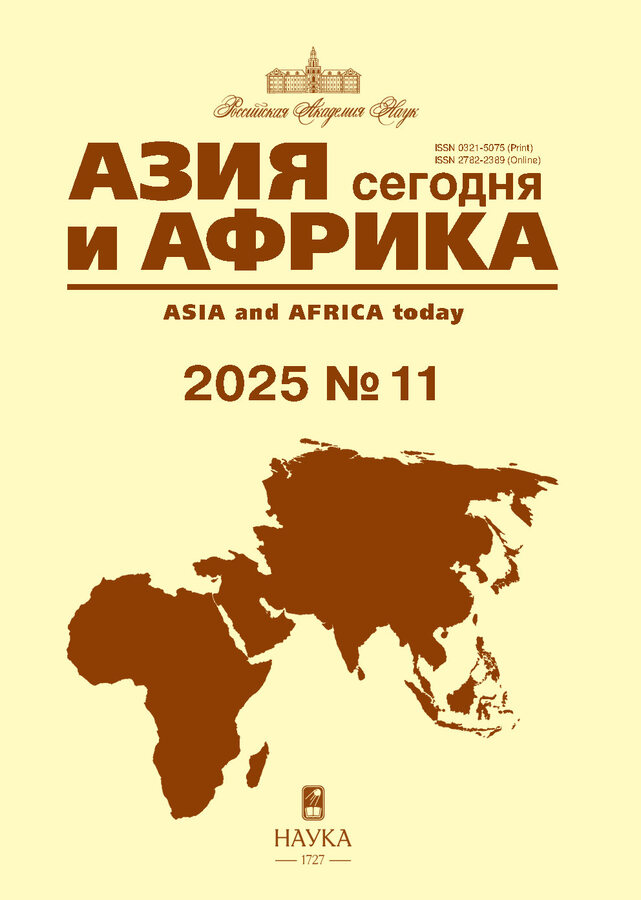Structural Limits of EU's "Strategic Autonomy" in the Indo-Pacific: Role of US and Chinese Policies
- Authors: Timakova O.A1
-
Affiliations:
- Diplomatic Academy, Ministry of Foreign Affairs of Russia
- Issue: No 11 (2025)
- Pages: 5-13
- Section: Politics, economics
- URL: https://journal-vniispk.ru/0321-5075/article/view/351619
- DOI: https://doi.org/10.31857/S0321507525110017
- ID: 351619
Cite item
Abstract
Keywords
About the authors
O. A Timakova
Diplomatic Academy, Ministry of Foreign Affairs of Russia
Email: o.timakova@dipacademy.ru
ORCID iD: 0000-0003-4185-0194
PhD (Political Science), Associate Professor, Department of Political Science and Political Philosophy Moscow, Russia
References
- Biba S. (Ed.). 2024. Europe in an Era of US-China Strategic Rivalry, Global Power Shift. Cham: Springer.
- Grare F. 2021. Reuter M. Moving Closer: European Views of the Indo-Pacific. Berlin: European Council on Foreign Relations.
- Melnikova Yu.Yu. 2022. EU strategy in the Indo-Pacific region: domestic drivers and the Chinese factor. Humanities and Social Sciences. Bulletin of the Financial University. № 2. Pp. 31–37. (In Russ.)
- Leushkin D.V., Samoilov N.G. 2024. The EU strategic approach to China (2016–2023). Contemporary Europe. № 5. Pp. 49–59. (In Russ.)
- Korovnikova N.A. 2024. The EU-PRC: cooperation, competition or "de-risking"? Current Problems of Europe. № 4. Pp. 87–105. (In Russ.)
- Hang Y. 2022. The EU Indo-Pacific Strategy and the China-Russia relations. Vestnik of Saint Petersburg University. International Relations. № 3. Pp. 311–329.
- Jian J., Fang J. 2024. The EU's Indo-Pacific Strategy. Motivations, influences, challenges, and implications for China. Vestnik of Saint Petersburg University. International Relations. № 1. Pp. 5–26.
- Romanova T.A. 2024. The Evolution of the discourse on sovereignty and sanctions and its significance for the EU's external relations. International Trends. № 1. С. 22–41. (In Russ.)
- Pugliese G. 2023. The European Union's Security Intervention in the Indo-Pacific: Between Multilateralism and Mercantile Interests. Journal of Intervention and Statebuilding. № 1. Pp. 76–98.
- Van Willigen N., Blarel N. 2025. Why, how and to whom is the European Union signalling in the Indo-Pacific? Understanding the European Union's strategy in the Indo-Pacific in the epicentre of multipolar competition. The British Journal of Politics and International Relations. № 1. Pp. 69–90.
- Schneider-Petsinger M., Nouwens V., Billon-Galland A., Cainey A., Price G. 2022. Transatlantic cooperation on the Indo-Pacific European and US priorities, partners and platforms. L.: Chatham House.
- Lai S., Bacon P., Holland M. 2023. Three decades on: Still a capability-expectations gap? Pragmatic expectations towards the EU from Asia in 2020. JCMS: Journal of Common Market Studies. № 2. Pp. 451–468.
- Ellison D., van Hooft P. 2024. NATO should not go to the Indo-Pacific. Atlantisch Perspectief. № 2. Pp. 30–35.
- Van Hooft P., Girardi B., Sweijs T. 2022. Guarding the Maritime Commons: What Role for Europe? The Hague: The Hague Centre for Strategic Studies.
- Childs N. 2023. The AUKUS Anvil: Promise and Peril. Survival. № 5. Pp. 7–24.
- Fedorovskiy A.N. 2024. The Indo-Pacific Region Between the Challenges of Confrontation and Opportunities for Interaction. MEMO Journal. № 10. Pp. 5–16. (In Russ.)
- Ikenberry G.J. 2024. Three worlds: The West, East and South and the competition to shape global order. International Affairs. № 1. Pp. 121–138.
- Plagemann J. 2025. Introduction to special issue: 'Foreign policy signaling in the Indo-Pacific: Responses to the US-China rivalry in a multipolar world'. British Journal of Politics and International Relations. № 1. Pp. 3–19.
- Lee S., Schreer B. 2022. Will Europe defend Taiwan? The Washington Quarterly. № 3. Pp. 163–182.
Supplementary files











